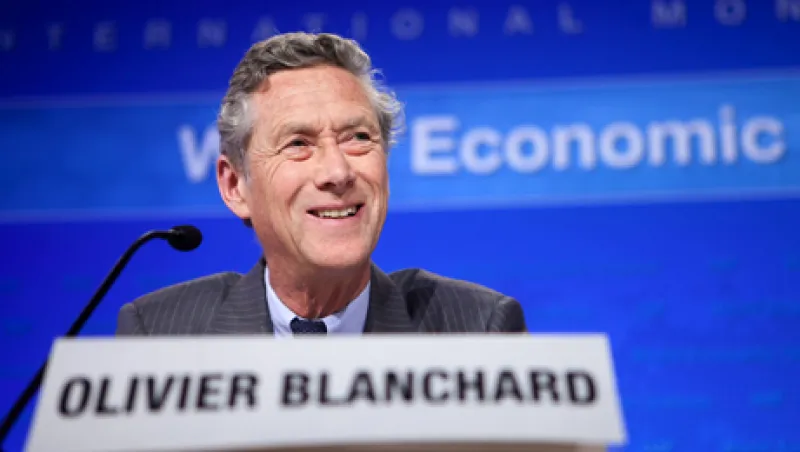Growth in the U.S. and European economies has slowed perilously close to stall speed, raising the risk of a double-dip recession, while emerging markets are losing some of their buoyancy, the International Monetary Fund said Tuesday.
The fund’s World Economic Outlook, the most comprehensive forecast of the global economy, painted a sober backdrop for the annual meetings of the IMF and World Bank in Washington later this week. The slowdown makes it all the more urgent for policymakers to take action to support growth, fund officials said, calling for bolder measures by the European Union to contain the bloc’s debt crisis, further unconventional monetary easing by the Federal Reserve and an acceleration of efforts by China and other emerging markets countries to stimulate domestic demand.
“The global economy has entered a dangerous new phase,” says Olivier Blanchard, the IMF’s chief economist. “Strong policies are needed both to improve the outlook and reduce risks.”
The IMF slashed its growth forecast for the U.S. to 1.5 percent this year and 1.8 percent in 2012, compared with its previous forecast of 2.5 percent and 2.7 percent, made only three months ago. Fund economists see the euro area growing by 1.6 percent this year and 1.1 percent next, compared with 2.0 percent and 1.8 percent previously. The fund shaved its growth forecast for emerging and developing economies by roughly a quarter point, to 6.4 percent this year and 6.1 percent in 2012. Altogether, the global economy will grow by 4.0 percent this year and next, the fund projects.
The downgrade represents an official recognition of what markets have been signaling over the past few months. Most private-sector economists have been reducing their forecasts in recent weeks. J.P. Morgan predicts the U.S. will grow by 1.4 percent this year and just 1.2 percent in 2012; it puts global growth at around 3.5 percent both years.
The global recovery was already slowing earlier this year but the worsening of the European debt crisis and the deterioration in the U.S. economy, exacerbated by the political brinksmanship over the debt ceiling in July and early August, have dealt significant blows to confidence, fund officials say. “Markets have become more skeptical about the ability governments to stabilize their public debt,” said Blanchard.
Europe’s debt crisis poses the greatest threat to the world economy, and drew the strongest policy prescriptions from fund economists. The World Economic Outlook called on European governments to quickly ratify the expansion of the European Financial Stability Facility, the bloc’s €440 billion bailout fund. EU leaders agreed in July to increase the facility’s effective firepower and range of uses in a bid to prevent the debt crisis afflicting Greece, Ireland and Portugal from spreading to Spain and Italy. In addition, the outlook called on the European Central Bank to keep buying European government bonds and to cut its benchmark interest rate, currently at 1.5 percent, if downside risks to growth persist.
“The perception is that policymakers are one step behind the markets,” said Blanchard. “Europe must get its act together.”
Fund officials sought to distinguish between Greece’s debt problems, which are severe but still “eminently manageable,” according to senior economic advisor Jörg Decressin, and the plight of other countries. Ireland and Portugal are fulfilling the terms of their EU-IMF bailouts, Decressin said, while Spain and Italy have taken fresh steps recently to rein in their deficits. “We still think it is crazy to talk about a breakup of the euro area,” he said. Still, Blanchard urged EU leaders to prepare contingency plans for a potential Greek exit. “Policies would be needed to ring-fence the other countries,” he said. “That would be absolutely essential.”
As for the U.S., the IMF’s Outlook said the Federal Reserve should “stand ready to deploy more unconventional support” to sustain growth. That call came as the central bank’s policy-making Federal Open Market Committee began a two-day meeting to consider shifting some of its massive bond holdings to longer-dated securities in an effort to drive down long-term rates.
Fund officials also warned of the risk that in the wake of the August debt ceiling deal, U.S. fiscal policy would tighten too much in the short term without making the kind of reforms that would reduce deficits and debt over the long term. Getting the balance right isn’t easy, Blanchard conceded. “Fiscal consolidation cannot be too fast as it would kill growth,” he said. “It cannot be too slow as it would kill credibility.”
Many private economists fear the U.S. won’t strike the right balance. Bruce Kasman, chief economist at J.P. Morgan, predicts that budget cuts will reduce U.S. growth by at least one percentage point next year. “Policy could actually do damage here,” he says.
The IMF Outlook contained a separate study showing that significant declines in equity prices can signal a recession in Western economies. It estimated that recent stock market declines put the risk of recession at 38 percent in the U.S., 17 percent in the U.K. and 18 percent in France.
Emerging markets continue to grow at a relatively strong pace, but the weakness in advanced economies does pose a risk. Blanchard said central banks in emerging markets countries, most of which have been tightening policy over the past year to combat inflation pressures, may have to ease policy in the near term.






